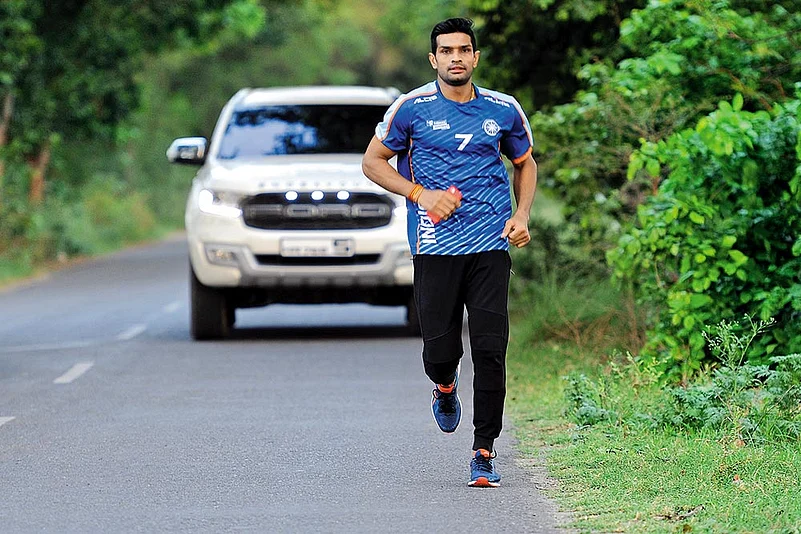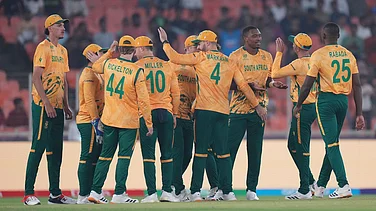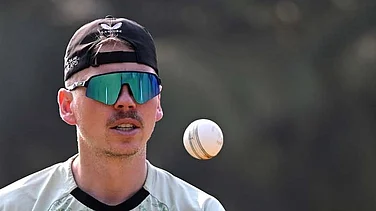Some time after the IPL spot-fixing case was at its messy nadir in 2014, casting a dark shadow over the sport itself and denting the image of the BCCI, Vidarbha Cricket Association president Prakash Dixit was having a meal with friends at a club in Nagpur. The giant-sized TV was beaming a cricket match. One of Dixit’s friends called out to change the channel to the one showing the Pro-Kabaddi League (PKL) live. “We were in CP Club, and a friend said, let’s switch from cricket to kabaddi, which was more thrilling and enjoyable,” recalls Dixit. It was a rare instance of a die-hard cricket fan swapping allegiance.
The incident illustrates how many fans have started seeing beyond cricket as their first-choice and openly embraced kabaddi after the advent of PKL in 2014. And why won’t they? The tension that grips the viewer when a fleet-footed raider darts into the competing team’s area, teasingly hovering like a bee, arms appraisingly outstretched for a touch, is palpable. Likewise, one is on the edge as the broken phalanx of players circle around the intruder, plotting the perfect entrapment, before the perfectly-timed lunge and grapple that ends so many audacious forays. Besides, this great game is among a few—chess is another—that can be called truly Indian.
Kabaddi has another claim to being a crowd favourite. The Indian men teams have won all seven men’s gold medals at the Asian Games since the inclusion of the sport in 1990, and both gold medals in the women’s category. Indian men have won all three World Cups held so far. But these exploits didn’t earn as many fans as the PKL has done over the last four years, with many players becoming household names by dint of their on-mat exploits.
Live telecast of the PKL has also brought big-time money for top players. Many of them have constructed new houses, bought flashy cars and are on their way to being almost as recognisable as the Kohlis and Dhonis. Earlier, playing on muddy fields in their inter-village tournaments they would win cycles and motorbikes, but the player auction, held in May, changed the paradigm, as the Rs 1 crore barrier was breached for the first time. Moreover, not one, but six players won bids of over Rs 1 crore.
After ace Iranian defender Fazel Atrachali (U Mumba) became the first one to get a Rs 1 crore cheque, Monu Goyat, an explosive raider from Haryana, became the costliest player in PKL history when Haryana Steelers enlisted him with a Rs 1.51-crore bid. Just to illustrate the galloping growth of players’ value in the PKL, the highest bid in the first season (2014) was Rs 12.80 lakh, for then India captain Rakesh Kumar. This year, Goyat (25), beat all-rounder Nitin Tomar’s record of Rs 93 lakh, established last season. Tomar himself was among the other new Indian crorepatis as Puneri Paltans bid Rs 1.15 crore to get him. The rest were Rahul Chaudhari (Rs 1.29 crore, Telugu Titans), Deepak Niwas Hooda (Rs 1.15 crore, Jaipur Pink Panthers), and Rishank Devadiga (Rs 1.11 crore, UP Yoddha).
The money and a fan-following have resulted in unknown players becoming stars and acquiring wealth. For example, the soft-spoken Goyat, originally from Kungar village in Bhiwani district, has a new house constructed in Hansi village of Hisar district, where his parents, grandmother and engineer brother live under one roof. “It’s a two-storey house and I had it constructed in 2016. Then, last year, I bought a Creta car. The lifestyles of kabaddi players have changed with PKL,” Goyat tells Outlook.
Rahul Chaudhari, who once nurtured hopes of joining the Indian Army, says the PKL has given him everything that he had been missing. “It has brought fame and recognition. It has changed my life,” says Chaudhari, who is from Jalalpur Choiya in Bijnor district of Uttar Pradesh and works as an Income Tax inspector in Delhi. Before hitting the jackpot this May, the deadly raider had won two bikes for being the best player in two local tournaments in his district. Last year, he built a new three-storey house, in which his parents, uncle, grandmother and three brothers live together. He drives a Scorpio car.
Deepak Hooda, a fearsome all-rounder, admits he hadn’t expected the crore-rupee bid. “The PKL didn’t just improve finances, it has brought fame, respect, and happiness for us. Now, people recognise us from a distance. We have also changed for the better—in behaviour, how to talk with people...for we are often invited as chief guests at functions and openings of malls…,” Hooda, who comes from Chamarian village, six km from Rohtak city, tells Outlook. He has now purchased a 500-yard plot in Rohtak for building a house, as well as a Rs 38 lakh SUV.
Similarly, for Puneri Paltans’ seasoned raider Nitin Tomar, PKL’s bounties have been a life-changing one. A petty officer in Indian Navy, the 23-year-old from Malakpur village in Uttar Pradesh’s Baghpat district also has a new house made last year and then purchased a Creta six months ago. “Earlier, nobody knew me. Now, everyone recognises me in every city I visit. It’s pleasing. And, thanks to the PKL, even city residents now know the rules of kabaddi [as it is telecast],” he says.
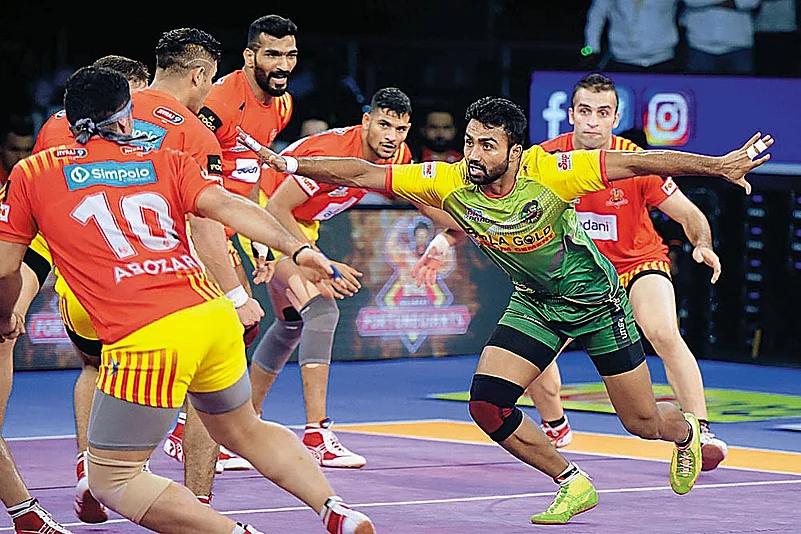
Monu Goyat (in green) in action during a PKL match
Goyat is now the highest paid non-cricketer sportsperson in India. His Rs 1.51 crore fee is better than that of India football captain Sunil Chhetri, who was bought by Bengaluru FC for Rs 1.5 crore for the 2017-18 edition; badminton ace H.S. Prannoy, who was bought for Rs 62 lakh by Ahmedabad Smash Masters in October and double Olympic medallist wrestler Sushil Kumar, who received Rs 55 lakh from Delhi Sultans last year. Star cricketers, of course, command prices that are on a different plane.
The PKL also proudly claims that it has the highest number of franchisees—12—in a sports league in India; football’s India Super League and I-League Division 1 have 10 each, and IPL has only eight. PKL’s title sponsor VIVO last year pledged Rs 300 crore for five years, till 2021, while the total prize money for the upcoming 2018 edition is Rs 8 crore.
Truly, TV has refined and glamorised kabaddi into a mass spectator sport, and a large chunk of credit for the PKL’s unimaginable metamorphosis goes to STAR TV, which has a 74 per cent stake in the PKL and is its broadcast partner. PKL is patronised by celebrities like Sachin Tendulkar and Abhishek Bachchan, who have bought franchises; cricketer Suresh Raina is the brand ambassador of a franchise.
Anand Mahindra, Chairman of the Mahindra Group and one of proponents of the PKL, derives satisfaction from its success. “I was thrilled to hear the Rs 1 crore-bid. It will provide a major impetus to kabaddi right down to the grassroots. When you elevate a rural sport like kabaddi you are opening a whole new set of career opportunities for sportspersons. PKL’s success will propel new aspirations through the village pipeline,” Mahindra, who pumped money into the PKL, tells Outlook.
The PKL story had germinated in 2006, during the Asian Games in Doha, where locals thronged the arenas as Indian men won their fifth straight gold. It was Mahindra’s brother-in-law, Charu Sharma, a well-known commentator and TV anchor, who got the idea of “doing something” with the sport in India after witnessing those unbelievable scenes in affluent Doha. Then, he casually shared his “wow idea” with Mahindra. The brew had started. During the 2010 Asiad in Guangzhou, Sharma again saw the all-round appreciation for kabaddi, despite hosts China not competing. Sharma and Mahindra again discussed the kabaddi project.
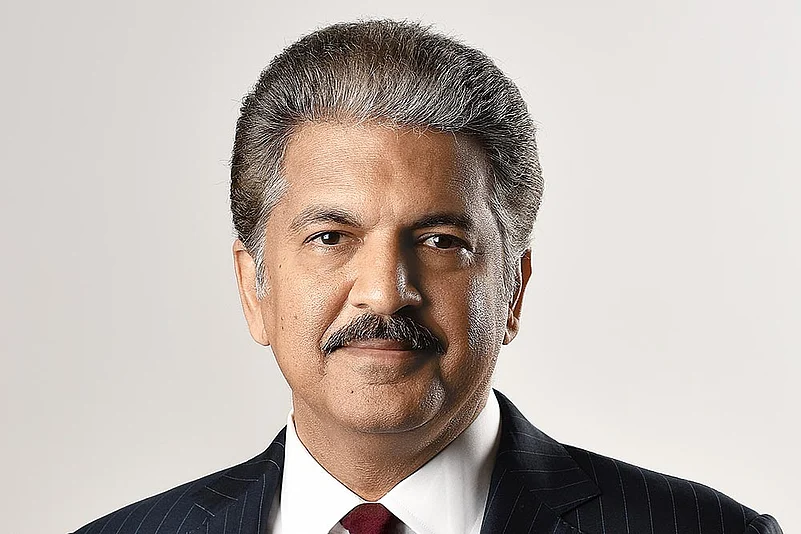
Mahindra felt that a kabaddi league, rather than a tournament, would perfectly gel with his tractor manufacturing business, asked his marketing team to look into starting a league, but “they didn’t get it”. “That’s when I felt encouraged to do it personally and so approached Charu. I could approach him because I did it personally. If it had been at Mahindra, there would have been a conflict of interest,” says Mahindra.
To launch the league on the lines of the IPL, a new company, Mashal Sports, was formed. And, as is evident now, the PKL became an unqualified success due to Mahindra’s investment and STAR TV seeing early potential in it. Mahindra is grateful to STAR TV, particularly its Chairman-cum-CEO Uday Shankar, for supporting his PKL concept, as the two have a lot of “mutual respect” for each other. The turning point came during their luncheon meeting at Harvard Club in New York. Shankar wanted Mahindra to give a bigger thrust to the PKL and the seasoned businessman, in turn, asked him to take charge of his baby, offering him a 74 per cent stake in the league.
“I give Uday a lot of credit for recognising the potential. STAR put in money even before season one [2014] had started. They are now the majority owners; we have 26 per cent stake. I told him I don’t believe in a 50-50 venture; somebody has to be in the driver’s seat. I’ve done this as a hobby, as my passion is to do new things. I will get satisfaction from seeing that kabaddi has been given a status and is seen as an alternative to cricket,” says Mahindra.
Repaying the trust bestowed on it, the PKL became immensely popular in its first year itself. “Influencers like Goyat will go a long way in convincing youngsters to take up the sport. Also, the PKL is a good lifeline for retired kabaddi players because, with the sport spreading, there would be more demand for coaches,” Charu Sharma points out.
Goyat is a wide-eyed witness to the PKL-propelled change in Haryana. “With the increasing popularity of PKL, more and more academies are opening. I reckon 40 to 50 academies would have opened in Haryana alone since the advent of the PKL, besides many in Maharashtra, Karnataka and Tamil Nadu etc.,” he says. Chips in Mahindra: “Now, people will not just think about pursuing cricket to make money, but will also think of playing kabaddi, with its gilded future.” And this time, the gold minted in India stays in India.






